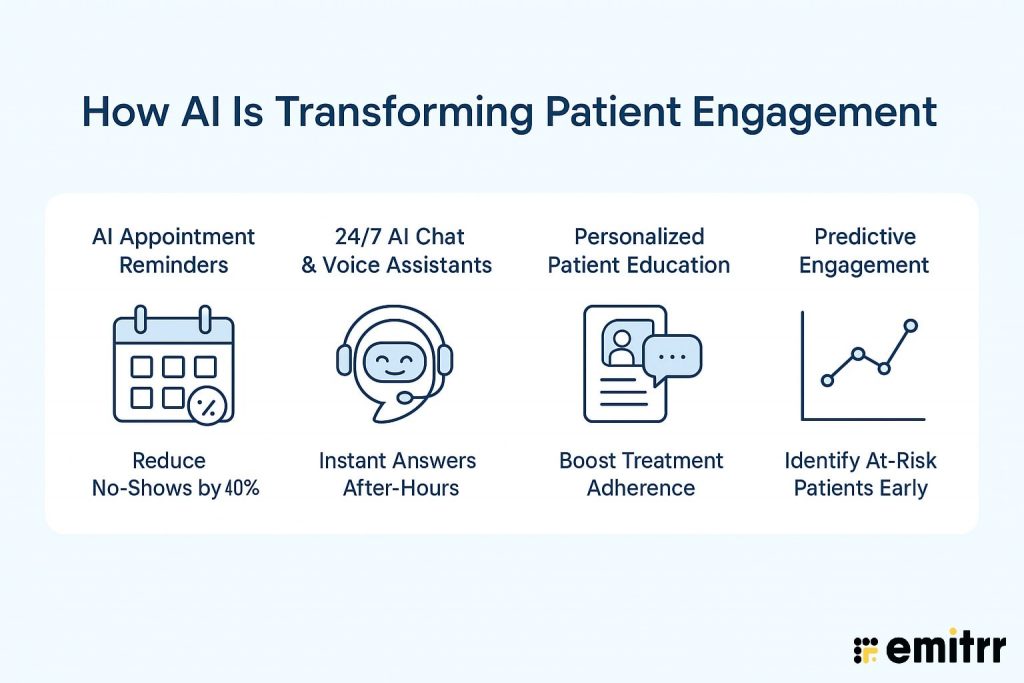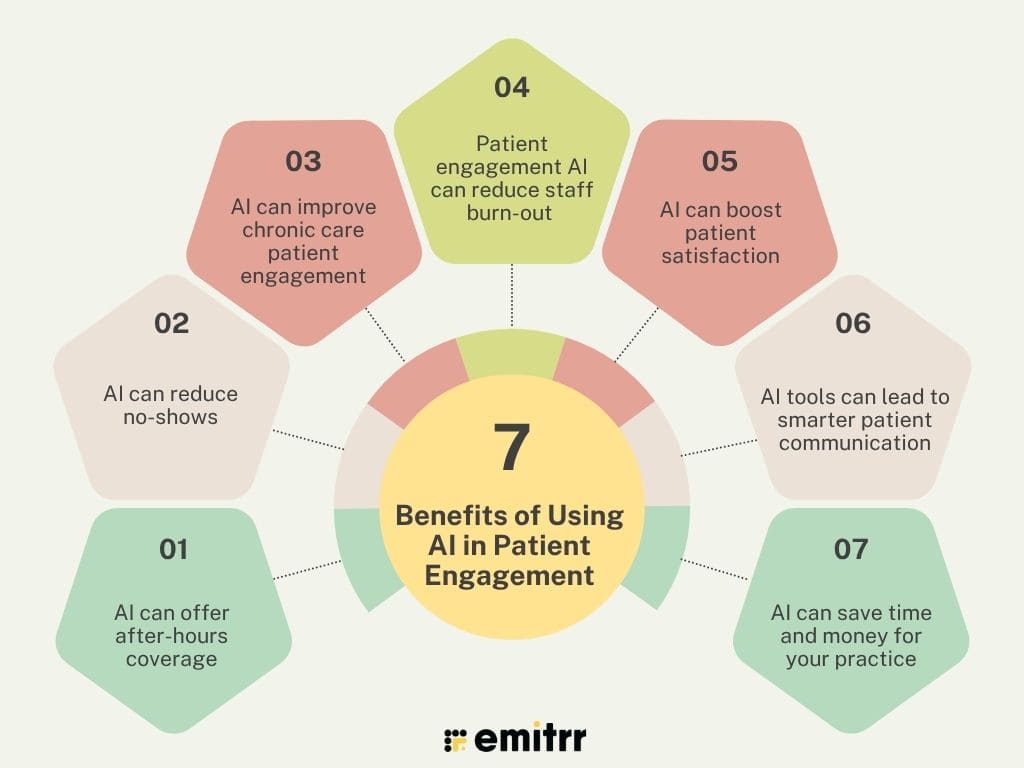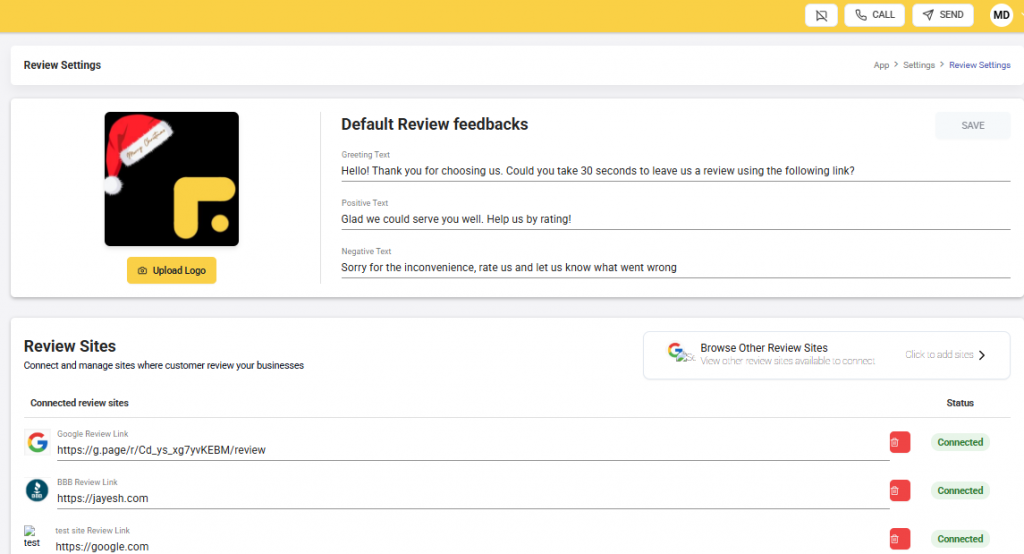Introduction to AI for Patient Engagement
Are you still engaging your patients without AI? Are you still sending reminders and booking appointments manually? Is your team feeling burnt out with repetitive tasks?
Not anymore! AI in patient engagement is completely changing the way healthcare practitioners communicate and engage with their patients. Today, AI SMS agents are answering FAQs, booking appointments, and calling agents are helping patients get solutions for non-emergency cases, to name a few.
Let’s delve deeper and see the benefits, use cases, and best AI patient engagement tools that can help you improve efficiency, reduce no-shows, save money, and deal with other operational challenges in healthcare in this guide.
What is AI in Patient Engagement?
Artificial intelligence in patient engagement is the use of AI tools such as virtual assistants, conversational AI chatbots, AI call answering systems, automated appointment and reminder systems, etc., to reduce no-shows, manual tasks, and to improve efficiency and overall communication with patients.
Today, AI in healthcare engagement is solving many challenges for healthcare professionals, they are not just looking for automation but for an AI healthcare tool that:
- Works alongside their team
- Automates tasks with intelligence and context
- Keeps data HIPAA compliant and secure
- Improves operation efficiency
- Reduces manual workload and burnout
- Improves overall patient experience
Keep on reading as we explore more benefits, top use cases, and one of the best tools for patient engagement.

AI for Patient Engagement: What the Numbers Say
The healthcare sector has come a long way, and AI is largely responsible for it. Several statistics mirror this growth, and we’ve rounded up the top three that reflect on this trajectory.
- The global AI in patient engagement market was valued at approximately USD 6.08 billion in 2023 and is projected to grow at a compound annual growth rate (CAGR) of 21.2% from 2024 to 2030, reaching an estimated USD 23.1 billion by 2030.
- A 2024 survey revealed that 40% of U.S. physicians are prepared to use generative AI tools during patient interactions at the point of care.
- In a randomized controlled trial, patients reported higher clarity of information and overall satisfaction when interacting with an AI assistant compared to standard care, while trust and perceived empathy levels remained similar.
How is AI Transforming Patient Engagement?
Healthcare organizations are going all-in on AI to turbocharge their operations — delivering personalized, predictive medical care while streamlining processes like never before. The once far-off idea of AI in healthcare is now a game-changing reality, making patient care faster, smarter, and more precise. One of the biggest shifts? Early and accurate diagnoses.
| Did you know? AI could slash treatment costs by 50% and boost health outcomes by 40%, according to Harvard’s School of Public Health. |
Operationally, AI is a lifesaver for hospitals. AI-led automation takes the burden off healthcare providers, performing routine daily tasks with greater speed and accuracy while freeing up valuable time for doctors and nurses. AI chatbots and virtual assistants have evolved to address common patient questions, handle scheduling, and manage medical records without requiring a human to lift a finger.

AI has also been instrumental in streamlining revenue cycle management by automating billing, claims processing, and insurance verification. This approach has proven effective in reducing human errors and ensuring faster, more accurate financial transactions.
Top 7 Benefits of Using AI for Patient Engagement
Take a look at how AI is changing the way providers engage with their patients:

AI can offer after-hours coverage
Providers don’t need to miss out on new patients or queries from existing patients, nor do they need to spend extra money to hire someone who can respond after hours. Healthcare AI tools now come with features like 24/7 SMS and call agent that can answer patient FAQs, collect forms, patient information, and take appointment bookings and more. Emitrr is a great AI tool for after-hours digital patient engagement and communication.
AI can reduce no-shows
Last-minute cancellations and no-shows impact revenue, and since manual reminders can be resource-heavy and inconsistent, an AI patient engagement tool can be a game-changer here. By implementing patient engagement AI, you can send smart automated reminders via SMS/email/voice, and with two-way rescheduling, you can ensure any last-minute no-shows or cancellations can be filled.
Take a look at this video if you wish to learn how you can reduce no-shows by 90%:
AI can improve chronic care patient engagement
Patients with chronic illnesses such as diabetes and others don’t adhere to their treatment plans and even skip follow-ups. Now, if providers were to track each one of them to improve their adherence or to re-engage them manually, it would be almost impossible. This is where AI in chronic care patient engagement comes in. Based on the patient information available in the system, AI can nudge patients with treatment plans and reminders from time to time, helping you improve chronic care patient engagement.
Patient engagement AI can reduce staff burn-out
Updating records manually, managing patient feedback, replying to FAQs, dealing with bookings, cancellations, or reschedules can eat up your front desk staff’s time. Patient engagement chatbots and ai IVR systems can handle repetitive calls and queries, they can manage intake and follow-up, allowing your staff to focus on other aspects of patient communication and reduce their burnout.
AI can boost patient satisfaction
Delays in communication can make your patients feel more anxious, ignored, or dissatisfied. Conversational healthcare chatbots can be a great way to avoid this and to improve patient satisfaction. A conversation AI like Emitrr that is meant for healthcare professionals can respond to patients faster and in a way that feels natural.
AI tools can lead to smarter patient communication
Sending the same reminders to everyone or replying without personalization does not work. And manual patient segmentation can be quite hard and inconsistent. This is again where artificial intelligence in patient engagement can help. Healthcare AI tools can not only smartly segment patients but can also do personalized outreach with created campaigns.
AI can save time and money for your practice
According to 2026 projections, AI can help healthcare providers save $150 billion annually. Approximately, $20 billion of this accounts just for conversation AI applications.
Hospitals can save tons of money by transitioning their call center resources to conversational AI. For non-emergency cases, patients can interact with patient engagement chatbots, website chatbots, or even IVR bots, without compromising on service. They can save money by connecting with their providers digitally without needing to spend time and money on in-person visits.
If you are looking for the best AI tool for patient engagement, then you should consider booking a call with Emitrr, that is known for its efficient AI sms agent and phone agent.

Top Use Cases of AI in Patient Engagement
Let’s explore the eight key AI use cases of how AI improves patient engagement:
AI Patient Engagement chatbots & Virtual Assistants
The frustration of waiting on hold for simple inquiries is all too common. AI chatbots and virtual assistants solve this problem by providing instant, round-the-clock support. These AI-driven systems offer virtual human assistance to answer health-related questions, schedule appointments, and guide patients through symptom assessments. By collecting necessary background information, AI enables doctors to conduct more efficient consultations.
360-Degree View into Patient Care Cycles
AI functions as a powerful diagnostic tool, processing patient data through ongoing monitoring. By combining medical records, past treatments, wearable device data, and doctor visit histories, AI creates a comprehensive health profile for each patient. This holistic view allows doctors to deliver personalized treatment plans based on evidence-based insights, reducing redundant tests, accelerating disease detection, and optimizing healthcare processes.
Predictive Analytics for Personalized Care
AI’s predictive capabilities allow healthcare systems to identify potential issues before they become critical. By analyzing medical records, lifestyle data, and genetic information, AI detects health risks early on. Whether it’s providing early warnings for heart disease or tailoring personalized diabetes care, AI supports preventative interventions and improves long-term patient outcomes.
Automated Appointment Scheduling & Reminders
No more missed doctor visits! AI streamlines appointment scheduling by recommending available time slots and sending automated reminders through phone, email, or text. This reduces patient no-shows, ensures better time management for doctors, and enhances overall clinic efficiency.
Patient Feedback & Sentiment Analysis
Understanding patient experiences goes beyond standard surveys. AI analyzes feedback from online surveys, review sites, and social media platforms to gain insights into patient sentiments. Healthcare organizations can harness this data to make informed decisions, improving their services and increasing patient satisfaction.
Efficient Administrative Workflows
AI simplifies administrative tasks by automating medical billing, insurance claims, and patient record management. By reducing paperwork and minimizing errors, AI allows medical staff to devote more time to patient care instead of administrative duties.
Risk Assessments for Preventive Care
AI excels at preventive care by identifying individuals at risk for conditions like hypertension, cancer, or stroke. By analyzing patient data, AI helps doctors recommend lifestyle changes, arrange preventive screenings, and create early intervention strategies. This proactive approach brings complications and the duration of hospital stays down.
Automated Summarization of Clinical Notes
Doctors often face the challenge of reviewing extensive patient records. AI offers a solution by generating concise summaries that extract essential details from medical histories, lab reports, and prescription data. These AI-generated summaries expedite clinical decision-making, leading to faster and more accurate diagnoses.
How Can Emitrr’s AI Agent Help Improve Digital Patient Engagement?
Emitrr is one of the best AI tools for digital patient engagement. Take a look at the many AI features offered by Emitrr:
Plethora of AI patient engagement features
- AI SMS Agent: Sarah, Emitrr’s intelligent SMS agent, handles appointment bookings, rescheduling, lead capture, reminders, and two-way conversations, entirely over text. She’s designed to work across industries and time zones, so your business is responsive, even when your team isn’t available.
- AI Voice Agent: Handles incoming calls, books or reschedules appointments, collects information, shares updates, and answers common questions, without hold times or voicemails.
- Self-Evolving AI: Built to learn from every interaction, Emitrr’s AI adapts its replies and improves conversation flow automatically, without needing manual updates or retraining.
- AI Call Handling & Queue Management: Ensures remote patient engagement by answering calls in real time, minimizes wait times, and keeps callers informed, so no inquiry is ever left hanging.
- Call Pop & Missed Call Texts: Displays caller information as soon as the phone rings. If a call is missed, a smart follow-up text is triggered automatically, helping you recapture leads or support requests.
- AI SMS Campaigns: Generate personalized, targeted campaigns without starting from scratch. Let AI draft, schedule, and optimize the message flow.
- AI Rule Engine: Set up custom workflows based on real-time triggers, appointment updates, no-shows, missed calls, or specific keywords using AI for patient communication.
- AI SMS Nudge: Automatically re-engage leads or patients who haven’t responded, without your team needing to follow up manually.
- AI Forms & Data Collection: Let AI handle intake forms, feedback, or survey responses collected directly through SMS, organized and export-ready.
- Smart Phone Trees: Go beyond static phone menus. Emitrr’s AI phone trees understand natural language, guiding callers based on what they say, not just what they press.
- Multilingual patient assistant: Reply to your patients in the language they feel most comfortable in with multilingual patient assistant feature.
Automated Appointment Scheduling & Reminders
Missed appointments? They’re a revenue killer. Emitrr’s AI swoops in with automated scheduling and reminders that actually work. Patients get timely texts sent from the practice’s own number. No more phone tags or forgotten slots. The system even handles rescheduling, cutting no-shows and keeping the calendar full. It’s like having a tireless assistant who never sleeps.
AI-Powered Patient Communication
One-size-fits-all robo-messages don’t and will never appeal to patients. Emitrr’s AI agent crafts smart, conversational texts that feel personal, like a friendly nudge, making patients feel genuinely cared for. Whether it’s confirming an appointment or following up post-visit, our AI agent adapts to patient responses and weaves interactions that build trust, for better remote patient engagement.
Review and Feedback Generation
Word-of-mouth still rules in healthcare, and Emitrr’s AI makes it almost effortless. After a visit, it sends a quick “How’d we do?” text, prompting patients for reviews on Google or wherever it counts. Healthcare institutions can customize these requests with their logo and style, making it a branded win.

HIPAA-Compliant Secure Messaging
Security is non-negotiable, and Emitrr’s AI agent makes sure it’s never dealt with in a cavalier fashion. Its messaging is locked down with a HIPAA‑compliant AI messaging feature, so patient data stays safe while texts fly back and forth. Whether it’s sharing test results or answering quick questions, providers and patients can chat confidently, knowing everything is safeguarded. It’s peace of mind with a dash of efficiency.
Patient Data Integration & Personalized Remote Patient Engagement
Emitrr’s AI agent can be integrated with over 500 systems—like Dentrix or eClinicalWorks—pulling patient data to tailor every interaction. Case in point: sending a “Happy Birthday” text with a check-up nudge. It’s personal and proactive and keeps patients feeling seen, not just scheduled.
Emitrr’s AI solution, safe to say, is a lifesaver for healthcare institutions juggling patient care and growth. By automating the grunt work and making interactions more meaningful, it’s redefining how healthcare engages. So, if you’re looking to streamline and smarten up care delivery, consider it done with Emitrr.

FAQs on AI for patient communication
AI improves digital patient engagement by weaving automation, personalization, and proactive health management into the very fabric of healthcare. Via predictive insights, chatbots, and tailored recommendations, AI lets patients feel that they are cared for. Interactions become streamlined, wait lines are reduced, and satisfaction levels hit the roof.
Artificial intelligence in healthcare communication facilitate data protection and confidentiality using a handful of measures, including:
Data encryption to protect information from unauthorized access.
Strict access controls to ensure only authorized personnel can view sensitive data.
Compliance with regulations like HIPAA to meet legal standards for patient privacy.
Data anonymization to remove identifying details before using data to train AI systems.
AI-driven monitoring to detect and prevent potential security breaches.
On top of these, transparency and patient access are integral to the process, ensuring patients know how their personal data is extracted, used, and stored. It’s a conscious step towards ensuring trust from the get-go and boosting patient-provider relations.
Yes. When implemented properly and ethically, artificial intelligence in healthcare communication ensures compliance with evolving regulatory requirements, such as HIPAA. Solutions like Emitrr’s AI agent prioritize patient data protection through robust encryption and secure messaging capabilities. These tools integrate seamlessly with existing systems, comply with legal guidelines, and enable the confident use of AI without compromising privacy. This ensures healthcare providers can communicate with patients and share updates securely and responsibly.
Yes, AI can reduce cancellations by sending automated, multi-channel appointment reminders and by giving the patient the option to reschedule the appointment rather than going for cancellation.
AI tools in healthcare comply with HIPAA by ensuring TLS 1.2+ and AES-256 encryption, role-based access, end-to-end encryption, secure storage, multi-factor authentication and more.
Yes, if you pick AI communication tools like Emitrr, that are meant specifically for healthcare, then you can rest assured and maintain HIPAA compliance and safety of PHI.
AI helps healthcare providers communicate faster, it helps them in sending more personalized responses, and in being available to answer queries 24//7.
Conclusion
In essence, AI for patient engagement is enabling slick workflows, maximized savings, and a dash of personalization, it’s enabling the future of patient interactions where there’ll be no frustration, just fulfillment.
With resources like Emitrr’s AI agent, businesses can take the right step toward becoming AI-first, automating what’s mundane, saving a great deal of time, and spurring innovation while keeping patients connected, content, and valued. Book a demo now to get started!

 4.9 (400+
reviews)
4.9 (400+
reviews)
